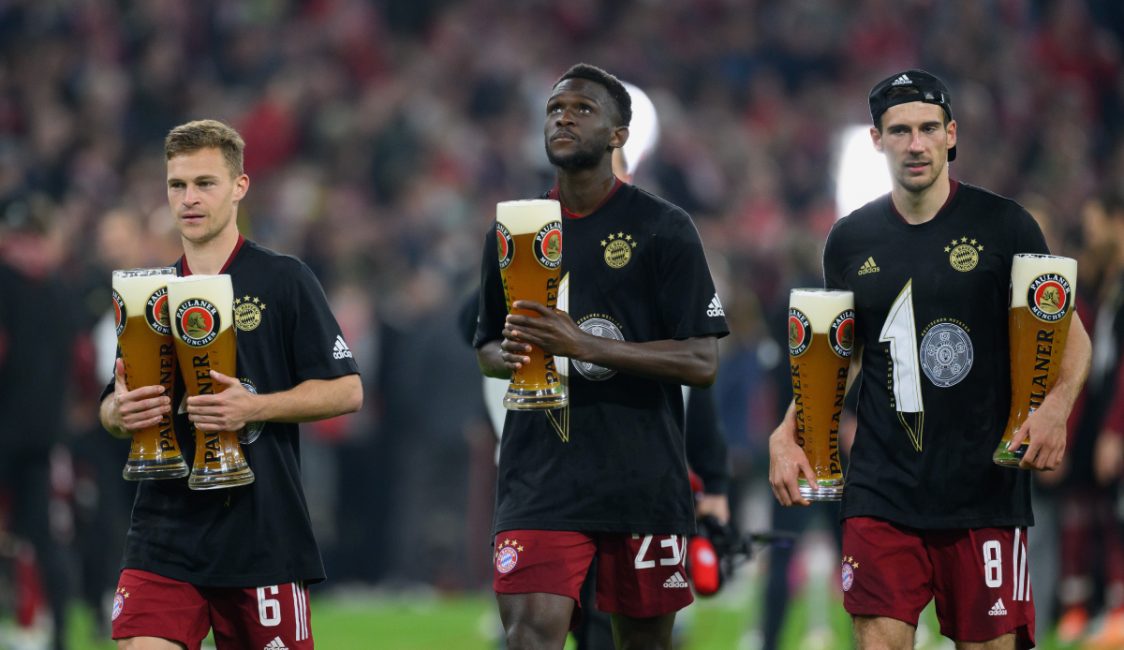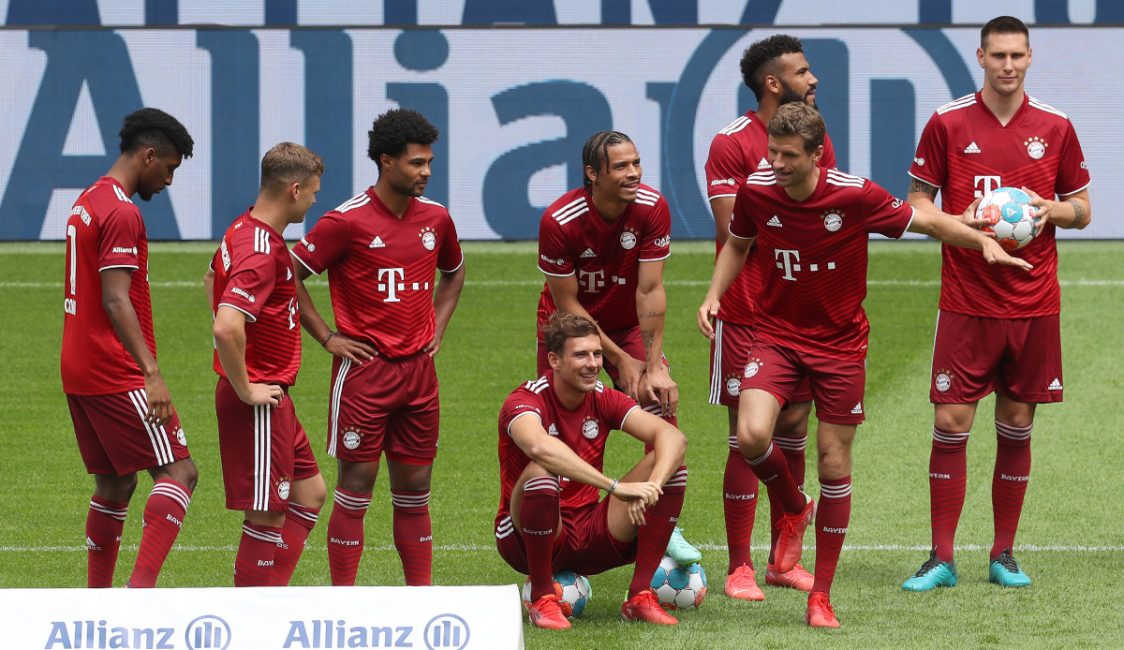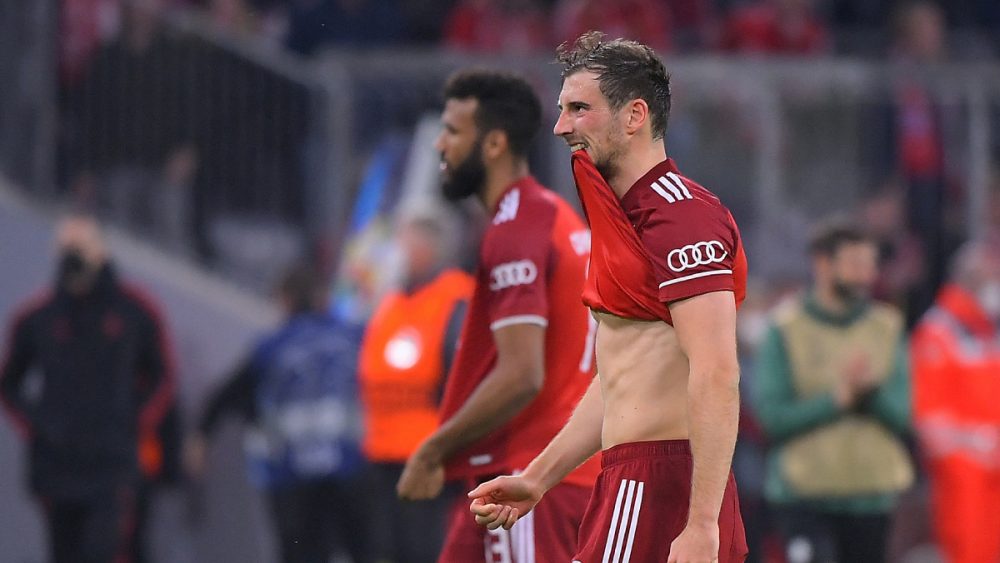FC Bayern no longer top among top contenders in the Champions League – five thoughts on the Bayern season
How do you really judge a season in which FC Bayern München “only” become German champions? Fifteen years ago, Bayern would probably have been content with that. Back then, the team used to make it to the semifinals of the Champions League every once in a blue moon, let alone win the title.
This season, however, there is a distinct feeling of dissatisfaction running through the club. The bitter defeat at the hands of FC Villarreal in the Champions League, the defeat in the DFB-Pokal by Borussia Mönchengladbach and a Bundesliga season that on many left a mixed impression at best, even though there is still a possibility of concluding the season on 81 points – a Bundesliga record just ten years ago, incidentally.
Miasanrot has drawn up five propositions on this still ongoing Bayern season to help sort out the conflicting feelings many have. The protagonists: the level of competition in the Bundesliga, Julian Nagelsmann, the squad, the Champions League title as a major goal, and the strategic direction of the club.
For FC Bayern, the Bundesliga can no longer be a benchmark
Children turning ten this year will not have seen a different German champion than FC Bayern München in their lifetime. This is a problem in several respects – including for the league champions themselves – with the most important one not even being the supposed lack of competitiveness in the Bundesliga. Only few will deny that the special feud with Borussia Dortmund is part of the myth surrounding the first treble in Bayern’s history in 2013.
But in 2020, Bayern won the Champions League, too, despite a largely faltering competition. Also, in the years before that, there were many close games in the Champions League against top clubs that Bayern did not lose despite the league being already decided. There are enough counterexamples to show that a close competition at home does not necessarily entail grater competitiveness in Europe.
Nevertheless, a more competitive Bundesliga would be desirable. After all, the quality of the domestic league has a bearing on a club’s prestige. Robert Lewandowski is perhaps the most recent example. Of course, money plays a big role for the attacker. But there are other reasons why he has been toying with a move to Spain for years. He is very unlikely to win the Ballon d’Or, which he so greatly desires, in Germany.
BVB not strong enough? Simple mathematics says yes
Who can blame those who say, disaffectedly, that the Bundesliga championship is a foregone conclusion? It is, of course, not. Bayern have to prove themselves over 34 games, usually against highly motivated opponents. Winning the championship is still an indicator of quality.
However, the gap has become too big. Bayern can afford to make more mistakes than any other club – by a distance. Yet in this argument the focus often shifts towards Dortmund. Why do they not manage to use their large financial lead over the competition more effectively and give Bayern a run for the money?
Ultimately, the black-and-yellows falter too often against teams like Hertha BSC or VfL Bochum, whose pockets are not nearly as deep as Dortmund’s. But this argument is seriously flawed. Not the individual games that are the problem but the sum total of them. The more games of a season have been played, the more likely it is that even small differences in financial strength (and thus quality) are manifesting in a growing points difference. That is simple statistics.

Image: Matthias Hangst/Getty Images
Bayern will remain champions in the years to come
The argument that the league is the basis for everything and is most likely to show whether a season was successful or not is invalid. It used to be that way. Today, that is no longer the case
Bayern end up being champions even in a bumpy season. A supposedly weak season now results in overall point totals that have only been achieved once by any other club in all of Bundesliga history.
This is not about laying blame either. This reflex is not helpful. At the heart of the problem is the reality for FC Bayern in this league: they will be champions at least nine times in the next ten years. At best, there will be small windows of opportunity if everything and a little bit more goes right for a competitor while going ill for FC Bayern at the same time. That is why the Bundesliga can no longer be used as the primary indicator of FC Bayern’s seasonal performance.
FC Bayern lack a strategy
Therefore, Oliver Kahn, Hasan Salihamidžic and Herbert Hainer – the three big faces of the new Bayern era – are the ones called on most. In the past year or two, there has been a change in communication that not all fans appreciate. With Kahn and Hainer in particular, a different tone has crept in. Methodical, cold, often unapproachable – in many respects the exact opposite of Uli Hoeneß.
Hoeneß was often criticised for his impulsive, confrontational manner. Karl-Heinz Rummenigge was too cold for some. But both, in a way, balanced each other out. The still-new club management is now expected to also find that kind of middle ground. Kahn’s recent appearance on the major German football chat show Doppelpass was a start. While always maintaining proper decorum, he showed some bite – at an appropriate level.
Ultimately, however, communication is only one aspect, and mostly a subordinate one. The public always gives more priority to the sporting side of things. If things are going well on the pitch, it almost does not matter what happens off of it. Not everything that did not work this season can be traced back to mistakes made by the current club management.
Nagelsmann as the center of gravity?
Hoeneß, in particular, was driven by his gut feelings. In retrospect, the succession of Louis van Gaal, Jupp Heynckes and Pep Guardiola can be seen as a masterpiece of grand strategy that ushered in perhaps the most successful era in the club’s history. But was it really a strategy? Or more of a coincidence?
In the years that followed, there was a much more rapid and seemingly random turnover in the coach’s chair. With Carlo Ancelotti, Jupp Heynckes, Niko Kovac, Hansi Flick four coaches followed who each stood for a completely different brand of football. Bayern’s squad management strategy is to consult with the coach but ultimately act as independently of them as possible. Is it time to rethink this kind of strategy?
In Julian Nagelsmann, they have appointed a young coach with a lot of ideas and the potential to start a new era. According to those responsible, he is already heavily involved in squad planning. Perhaps it time to involve him even more strongly. The confidence in him is apparently huge, despite his overall bumpy start to life at FC Bayern.
The fact that the squad is so poorly balanced is also the result of a purchasing policy that often went through crazy twists and turns even within one transfer period. Many players came at the last minute, often apparently as a last ditch contingency.
Hansi Flick was saddled with the same problems
Hansi Flick also almost failed as a consequence of squad planning. The pause granted by the COVID-19 pandemic came at just the right time, just when the players were showing the first signs of fatigue and Robert Lewandowski was out injured. Flick’s time is often glorified because of the many titles – and rightly so.
On the other hand, people fail to recognize how critically the squad was viewed even back then – and rightly so too. Flick did not rotate much, he did not trust the players much beyond squad positions 12 or 13. This came back to haunt him when he had to go into the new season without a proper summer break and his team plodded through the season even more erratically than this year.
Notwithstanding the titles, the conclusion suggests itself that the club’s strategy over the last few years was on many levels too arbitrary and ultimately too uncreative, especially with respect to the transfer market. Yet as a corollary this also requires an adjustment of the demands for the present. Because a change of strategy will take time to materialize in tangible results – especially in a time that has become so demanding due to COVID-19.
Julian Nagelsmann is the right coach for FC Bayern
Julian Nagelsmann should play a central role in this planning. Not everything that went so well at the beginning of the season was a direct outflow of his genius. But neither is everything that is going less well now attributable to him. The problems are too profound for that. Next summer, for the first time, he will have a great opportunity to really influence the composition of the squad. He will also have more time for preparation.
For Nagelsmann, Flick’s instant and gigantic success with his many titles has been a burden in that it has largely obscured the view for the progress the team has made under him compared to the previous season. It is unclear whether Bayern this season with two games to go will beat the 99 Bundesliga goals they scored in the previous season (they currently have 93). But in terms of goals against (from 44 to currently 33), expected goals (from 75.8 to 82.8) and expected goals against (from 41.0 to 33.9), there is a small yet clear improvement.
Yet there are certainly many open issues that the coach must still address. This concerns performance consistency as well as personnel choices. At the same time, Nagelsmann was simply powerless in many of the developments under which he now suffers. Next season will be a landmark season for Nagelsmann and Bayern. But he has indicated, despite the setbacks, that he is the man that the club can trust to build the future of the club.
FC Bayern’s strength in depth is overrated
To be more successful, Nagelsmann will also need a better balanced squad. One justified criticism was the strength in depth of the current squad. Too many players could not be a real consideration for serious first IX rotation. Less discussed, however, was the first XI itself. The assertion that Bayern would be competitive in the Champions League of the first XI is fit and available persists.
It is true that more options for rotation can lead to more rested first team players. But this season, important cornerstones like Serge Gnabry, Leroy Sané, Kingsley Coman, Leon Goretzka and Alphonso Davies remained below their potential. All for different reasons. Coman, Goretzka and Davies, for example, were either out for a long time or available on and off. They could not develop a rhythm.
Sané and Gnabry were altogether too unpredictable in their performances. When they are in top form, they are world-class, but to be truly world-class, they have to deliver consistently. But even players like Joshua Kimmich, Thomas Müller, and Robert Lewandowski went through a crisis of sorts toward the end of the season.

Image: Alexandra Beier/Getty Images
The core of the team did not work. Therefore, the discussion about the squad should actually begin here: Is there enough strength even at the very top to reach the most ambitious goals? Or do Bayern need one or two new players with immediate and substantial impact for the first team? Overall, the quality of the starting eleven is probably overestimated. New blood would do the team good.
Champions League: title win is aiming to high
But FC Bayern is spoiled anyway. Spoiled by many Champions League finals, semifinals and two wins in the top division, it was quickly accepted as fact that the Bayern team was one of the top three in Europe. But this period has actually been over since the departure of Pep Guardiola.
The successes became rarer and less predictable after that. Bayern is certainly not as far removed from the top as they like to make believe after the exit against Villarreal, but they have not been in the inner circle of absolute top favorites for quite some time.
Even in 2020, they were not. A lot of factors coincided most fortunately back then. Historically, Bayern have also rarely been in the premier category. The wider circle of favorites is the natural habitat of FC Bayern München. That sounds worse than it is. Statistically, Bayern will most probably win the Champions League again in the future.
Winning the CL title? Exception rather than rule
If Bayern accept this place, they can even draw energy and inspiration from it. Especially since there is a difference between reality and aspirations.
Bayern will and must continue to strive to be among the top favorites. That must be both ambition and goal. Within the club, however, they will have to remain realistic.
Accordingly, the picture for the future is problematic: on the one hand, there is the Bundesliga, which is losing importance both in terms of quality and reputation as a serious challenge, and on the other hand, there is the Champions League, in which they will probably be a serious title contender only every now and then.








Poor contract negotiations, poor communication with players, nags trying to force a formation we don’t have a squad for, nor have the board provided the players for. Then his insistence of playing players out of position.
Most of our issues are self created and easily avoided – I know a player/manager is never bigger than the club but to lose Flick is an epic failure and embarrassment, the club should have done almost everything to keep and support him.
I find it hard to identify with bayern anymore.
Preparing myself for a half decade or so of mediocrity.